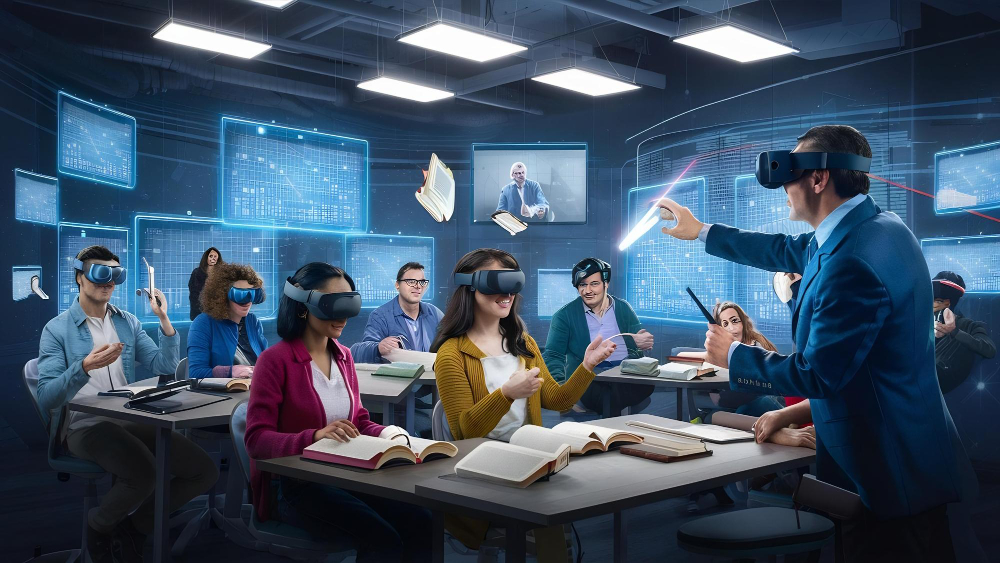Teaching has changed quickly in recent years. Technology, fresh methods, and stronger training models are shaping the way teachers grow. Digital mentoring and urban residencies play a big role in this change. At Acacia University, we build our Ed.D. and M.Ed. programs around these approaches. Our focus is on helping educators become confident, classroom-ready leaders. Let’s see in detail.
The Rise of Digital Mentoring in Education
Mentoring has always been part of teaching. Experienced educators guide new teachers. Leaders coach staff. Professors mentor graduate students. But until recently, mentoring was often informal and face-to-face only.
Today, digital mentoring platforms have brought many changes in this process. With structured systems, built-in tracking, and communication tools, mentoring has become more planned, consistent, and scalable.
Some of the key features of digital mentoring include:
- Smart pairing tools that match mentors and mentees based on shared goals, subject areas, or experience levels.
- Goal tracking dashboards that show progress in real time.
- Integrated communication tools such as video calls, chat, and resource libraries.
- Analytics and reports that give insight into impact and growth.
For teacher development, this makes a huge difference. A new teacher in a small town can still have access to expert mentoring. An experienced educator can support several mentees without being overwhelmed, thanks to scheduling and task management features.
Digital mentoring makes the process:
- Consistent – Regular check-ins and feedback are built into the system.
- Accountable – Goals and milestones are tracked.
- Scalable – More teachers can be mentored without losing quality.
This is why we see digital mentoring as a cornerstone of modern teacher preparation.
Why Mentoring Matters for Teacher Development
Why do we emphasize mentoring so strongly in our programs? Because mentoring changes outcomes.
New teachers often face challenges such as:
- Managing classrooms effectively.
- Adapting lessons for diverse learners.
- Handling workload and stress.
- Using technology in meaningful ways.
Without guidance, these struggles can feel overwhelming. But with a mentor, the story changes. A mentor offers strategies, reassurance, and perspective. Instead of navigating alone, teachers learn from someone who has been through the same challenges.
With digital tools, mentoring becomes even stronger. Teachers can connect with mentors across the country—or even across the globe. They can access written notes, recorded sessions, and curated resources. Growth becomes faster, more targeted, and more accessible.
For schools, this also reduces turnover. Teachers who feel supported stay longer. For students, it means more effective teaching and better outcomes.
The Urban Teacher Residency Model
Another innovation reshaping teacher preparation is the urban teacher residency (UTR) model.
A residency is very different from the short student-teaching placements of the past. In a residency, teacher candidates spend a year or more working alongside an experienced mentor in a classroom. They study theory in their coursework while practicing in a real school every day.
It is very much like a medical residency. Doctors train in hospitals under supervision. Teacher residents train in classrooms under the guidance of expert educators.
Why urban residencies? Because urban schools are vibrant, diverse, and full of real-world challenges. By learning in these settings, residents gain skills to:
- Teach in culturally rich and varied communities.
- Manage large and diverse classrooms.
- Adapt instruction for multilingual and multi-ability students.
- Work within complex school systems.
Residencies prepare teachers who are ready to lead on day one both in theory and practice.
The Power of Blending Study and Practice
Reading about classroom management is not the same as standing in front of thirty students. Learning about inclusive education is different from adjusting a lesson mid-class for a student who needs support.
That is why we believe strongly in combining academic study with real-world practice.
Residency models give our students space to apply what they learn, while still having the guidance of a mentor. Mistakes become valuable lessons. Successes build confidence.
Digital mentoring adds an extra layer. Residents can reflect on their daily experiences, share logs with mentors online, and receive detailed feedback. They can also connect with peers in other schools, forming a supportive community.
This combination of study and practice produces educators who are resilient, adaptable, and innovative.
How We Integrate Mentoring and Residencies at Acacia
At Acacia University, we weave both digital mentoring and residency-style learning into our Ed.D. and M.Ed. programs. These are not optional extras. They are central to our philosophy of preparing strong educational leaders.
Here is how we do it:
1. Digital Mentoring as a Core Feature
We use structured mentoring platforms to pair students with experienced educators. Progress is tracked, feedback is continuous, and support is always available. This ensures that each student moves through the program with guidance.
2. Residency-Style Experience
We encourage our students to engage in long-term school placements that mirror the residency model. This means spending extended time in classrooms, learning directly from mentor teachers, and applying theory in real settings.
3. Blended Learning Approach
Our programs combine online learning with local practice. Students can study on a flexible schedule while still gaining hands-on classroom experience. This balance allows professionals to advance their studies without stepping away from their careers.
4. Leadership Pipeline
By integrating mentoring and residencies, we create a pipeline of classroom-ready leaders. Our graduates leave not only as effective teachers but also as future instructional coaches, administrators, and change-makers.
Benefits for Our Students
Choosing an Ed.D. or M.Ed. with us means gaining unique advantages:
- Personalized mentoring that adapts to individual goals.
- Hands-on experience that builds confidence and skill.
- Networking opportunities with educators across regions.
- Leadership preparation for roles beyond the classroom.
- Adaptability in diverse schools, especially in urban settings.
Our students do not just graduate with a degree; they graduate with real-world practice, professional networks, and the confidence to lead.
The Broader Impact
The impact of our programs goes beyond the individual student. By preparing confident and skilled teachers, we help strengthen schools and communities.
When educators feel supported and prepared:
- Student learning improves.
- Teacher retention increases.
- Schools become more stable.
- Communities gain from stronger educational systems.
Global Relevance
Although the residency model began in the United States, the principles apply worldwide. Schools everywhere face the same challenge: how to prepare teachers who are ready for real classrooms.
Through digital mentoring, our students can connect with educators across borders. They share strategies for multilingual classrooms, inclusive teaching, and technology integration. Urban residencies, meanwhile, reflect the reality of education in many parts of the world, where schools are diverse and dynamic.
Challenges and Solutions
Every innovative model has its challenges. We recognize them, and we address them directly.
- Time Commitments: Balancing coursework, residencies, and mentoring can feel heavy. We design flexible schedules and online access to make it manageable.
- Technology Barriers: Not every school has the same tools. Our digital platforms are mobile-friendly and easy to use so that students can stay connected from anywhere.
- Resource Needs: Residencies require strong partnerships with schools. We build close relationships with districts to make sure our students have placements that truly support their growth.
Frequently Asked Questions
How long is a teacher residency program?
Most teacher residency programs last one full school year. This allows residents to experience the entire teaching cycle, from the first day of school to final exams. The extended timeline helps future teachers build confidence and classroom-ready skills.
What is digital mentoring in education?
Digital mentoring in education is the use of online platforms to connect teachers with experienced mentors. These tools include video calls, progress tracking dashboards, and resource libraries. Digital mentoring makes it easier to provide structured, ongoing support, especially for new teachers.
How is a residency different from student teaching?
In traditional student teaching, placements may last only a few weeks. A residency program is much longer and more immersive. Residents work alongside mentor teachers for a year or more, gaining deeper experience in classroom management, lesson planning, and student engagement.
Do I need teaching experience before joining a teacher residency program?
No. Teacher residency programs and digital mentoring support both new teachers and experienced educators. Beginners learn classroom basics, while seasoned teachers can use mentoring to prepare for leadership roles such as instructional coaches or administrators.
How do digital mentoring platforms track teacher development?
Teacher mentoring software usually includes goal-setting tools, progress dashboards, and regular feedback logs. These features help both mentors and mentees monitor growth over time and stay accountable to professional goals.
Are urban teacher residency programs only for big cities?
No. While the urban teacher residency model was designed for city schools, the skills learned, such as, working with diverse learners, multilingual classrooms, and community partnerships. These are valuable in suburban and rural schools as well.
Is digital mentoring available only in the U.S.?
No. Digital mentoring in education is used worldwide. As long as there is internet access, teachers can connect with mentors across regions. At Acacia University, we use these tools to support educators in different countries.
How does Acacia University integrate mentoring and residencies into its programs?
In our Ed.D. and M.Ed. programs, we combine digital mentoring platforms with residency-style learning. Students get one-on-one online guidance from experienced educators while also applying theory in real classrooms. This blended approach creates confident, classroom-ready leaders.
What career opportunities come after completing a doctorate in education online or an M.Ed.?
Graduates of our programs pursue careers as classroom teachers, instructional leaders, curriculum specialists, principals, higher education faculty, and policy advisors. The combination of mentoring and residency experience prepares them for both teaching and leadership roles.
Will digital mentoring in education grow in the future?
Yes. Digital mentoring platforms are becoming more advanced, with features like AI-driven feedback, virtual observations, and global networking. These innovations will continue to shape how teachers receive support and professional development.
Conclusion: Preparing Tomorrow’s Leaders
Education today demands leaders who can think critically, adapt quickly, and act with confidence. Leaders who can balance theory and practice. Leaders who can handle diverse classrooms and embrace technology.
At Acacia University, we are proud to prepare these leaders. By integrating digital mentoring and urban residencies, we ensure that our Ed.D. and M.Ed. graduates are more than degree holders. They are professionals who have practiced, reflected, and grown under expert guidance.
We see our graduates step into classrooms not as beginners, but as confident, classroom-ready leaders. They are prepared to support students, strengthen schools, and shape the future of education.
If you are ready to advance your career in education, join us. Our programs offer the support, practice, and challenge you need to grow into the leader you aspire to be.









